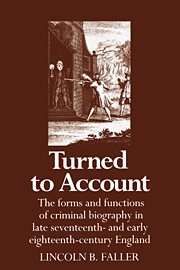 Turned to Account
Turned to Account Book contents
- Frontmatter
- Contents
- Preface
- Part I Turning criminals to account: three case histories and two myths of crime
- Part II Enucleating the truth: the criminal as sinner turned saint
- Part III Palliating his crimes: the thief as various rogues
- Postscript: Criminal biography and the novel
- Appendix I Who read the popular literature of crime?
- Appendix II The politics of thieving
- Notes
- Select bibliography
- Index
Appendix II - The politics of thieving
Published online by Cambridge University Press: 05 February 2012
- Frontmatter
- Contents
- Preface
- Part I Turning criminals to account: three case histories and two myths of crime
- Part II Enucleating the truth: the criminal as sinner turned saint
- Part III Palliating his crimes: the thief as various rogues
- Postscript: Criminal biography and the novel
- Appendix I Who read the popular literature of crime?
- Appendix II The politics of thieving
- Notes
- Select bibliography
- Index
Summary
So fond was Read's Weekly Journal of the notion that “all the Rogues, Whores, Pimps, Thieves, Fools, and Scoundrels in the Kingdom” were Tories, and “all the Whores and Thieves … High-Church” (29 August, 18 July 1719), that it took positive exception to the following piece of news: “Four Clergymen? having been to make a Visit, on Tuesday last, at Cashalton, and returning home in a Coach between Nine and Ten at Night, were set upon by two Highwaymen in a Lane half a Mile on this side Cashalton, who robb'd them of their Money, a Watch, and their Perukes, gave them ill Language, and rode off” (the Post-Boy, 19–21 July 1720). This seemed no innocuous or neutral report to Read's, which quotes from it, but rather–given the robbers' lack of “Respect for the Church [and its] immediate Sons”–a “witty Way” to “insinuate … the Highwaymen were Whigs.” If so, huffs Read's, “I wou'd only have it answer'd, That they are the first Highwaymen since the Revolution that have been of that Principle” (23 July 1720).
Read's was a mouthpiece for the Whig ministry, and one would be inclined to dismiss such stuff were it not so unidirectional. Tories almost never claim that thieves are actually Whigs, though they regularly claim the reverse, that Whigs are thieves or worse than thieves (but for an account of two whores who “pretended to be mighty Whigs,” then got “an ignorant young Man” drunk and robbed him, see Mist's Weekly Journal, 9 January 1719).
- Type
- Chapter
- Information
- Turned to AccountThe Forms and Functions of Criminal Biography in Late Seventeenth- and Early Eighteenth-Century England, pp. 209 - 211Publisher: Cambridge University PressPrint publication year: 1987
